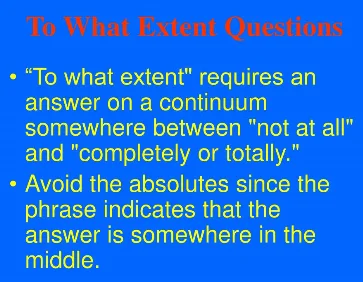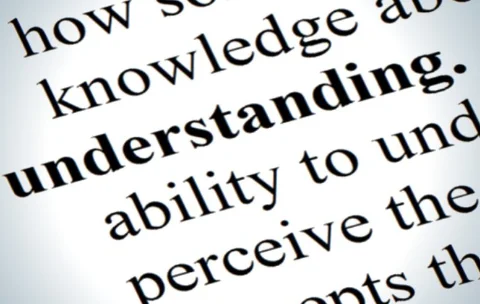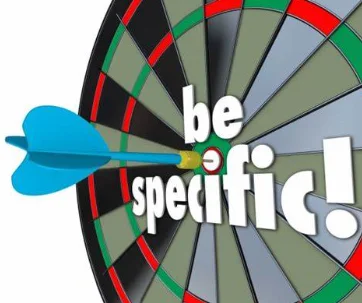

In the real world, deciding which factor is more important than another may seem impossible. However, when answering a question such as “what is ‘to what extent question, they are ultimately asking you to decide a single factor’s importance in comparison to another.
It is a good idea to be upfront about your approach and how you plan to answer it. Read on.


First, you must determine what “extent” you want to measure. If it’s the extent of your knowledge about something, then you need to know how much you know about it.
If it’s the extent of your experience with something, then you need to know how much time and energy you’ve invested in it.
Second, you must determine what kind of “to what extent” question you’re asking.
If the question is about what extent this has on me (i.e., how does it affect my life), then use an absolute term such as “a lot,” or “much.”
If the question is about how much this leads me toward some goal (i.e., how do I benefit from this), then use a comparative term such as “more,” or “less.”
To answer a ‘to what extent question, you need to explain what the situation is like. If you can’t do this in your first response, you should think about how to answer the question again before responding with a second response.
If you are unsure how to answer the question, you haven’t thought about how to answer it enough. In this case, try researching the topic and coming up with some ideas for responses that would be relevant to the test context.
Finally, once you’ve determined what kind of question it is and how much each answer will help give it context, answer based on that context!
The “to what extent” question is a great place to start because it allows you to discuss the relationship between the two things.
When approaching these question, ensure you understand how each item functions within your overall goal. These are just some general tips:

The first step in answering this type of question is understanding what you are being asked. The answer will depend on the context and the nature of your response.
For example, if you are asked ”to what extent the student understands the concept of Pythagoras,” then it is not enough for you to say that he knows about Pythagoras.
You will need to elaborate on how much he understands this concept. If you have difficulty explaining how much your student understands about Pythagoras, then he may not understand it well enough for your purposes.
Once you have established what question is being asked, think about how best to answer it based on your knowledge of that topic or area of study.
In most cases, however, there is no right or wrong way to answer such questions; rather, it depends upon whether or not your answer will help clarify the main point made by your instructor or professor.
To be able to answer this type of question, you need to be clear in your mind about the meaning of the word ‘to what extent. This means that you need to be able to define clearly what you mean by it. You also need to be able to explain how much is enough and too much.
The best way of doing this is by asking someone else who knows better than yourself about these things. If you have a friend or colleague who can help, this can be done by asking them for their advice on how to answer the question.
They may not always agree with your interpretation of what they say, but they will likely give examples that will help show why they think it’s right or wrong.

When describing how one item relates to another, be as specific as possible. Avoid using vague statements such as “it’s important” or “it’s essential.” Instead, give examples from your own experience and knowledge.
Use concrete examples to explain your answers. For example, instead of saying, “I’m good at planning,” say, “I helped my boss plan his trip last year.”
If possible, include documents or visual aids showing how you’ve demonstrated your skills.
Don’t just say yes or no; make sure your answer is interesting enough to catch the interviewer’s attention. Saying “yes” has its place in an interview.
However, don’t be afraid to add some color with some personal anecdotes about how you’ve demonstrated those skills in the past that may not directly relate to what they’re looking for.
Take your time! Read through each choice carefully before choosing the most relevant and appropriate for your answer. This will save time and improve your chances of answering correctly (if you make errors from rushing through, there may be little time left on the paper).
1. To what extent have you been able to learn Chinese?
2. To what extent do you feel that your English skills have improved?
3. To what extent do you agree or disagree with the following statement: “I don’t enjoy learning languages.”
4. To what extent do Chinese people learn from the Japanese during the war?
5. To what extent is it true that most people do not know how to swim?
6. To what extent should a student be able to speak a foreign language?
7. To what extent should the government try to limit immigration?
9. How much does the price of gasoline affect the average American family’s disposable income?
10. What is your name? -To what extent do you agree/disagree with the statement “I am a good person”?
11. How many times have you been to the cinema? -To what extent do you agree/disagree with the statement “I enjoy going to the cinema”?
12. Which of these books do you like most? -To what extent do you agree/disagree with the statement “I like reading books”?

With over 10 years in academia and academic assistance, Alicia Smart is the epitome of excellence in the writing industry. She is our chief editor and in charge of the writing department at Grade Bees.